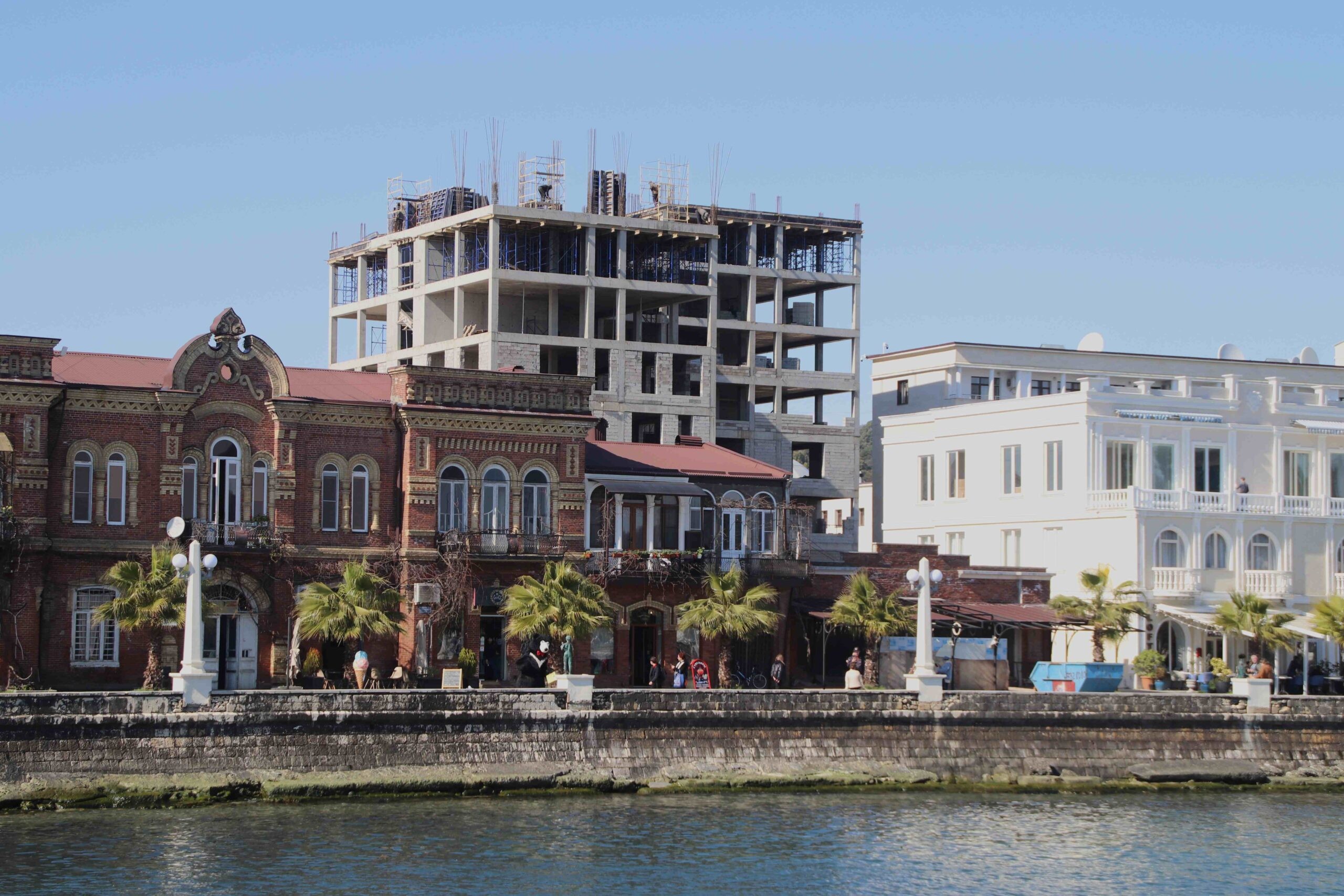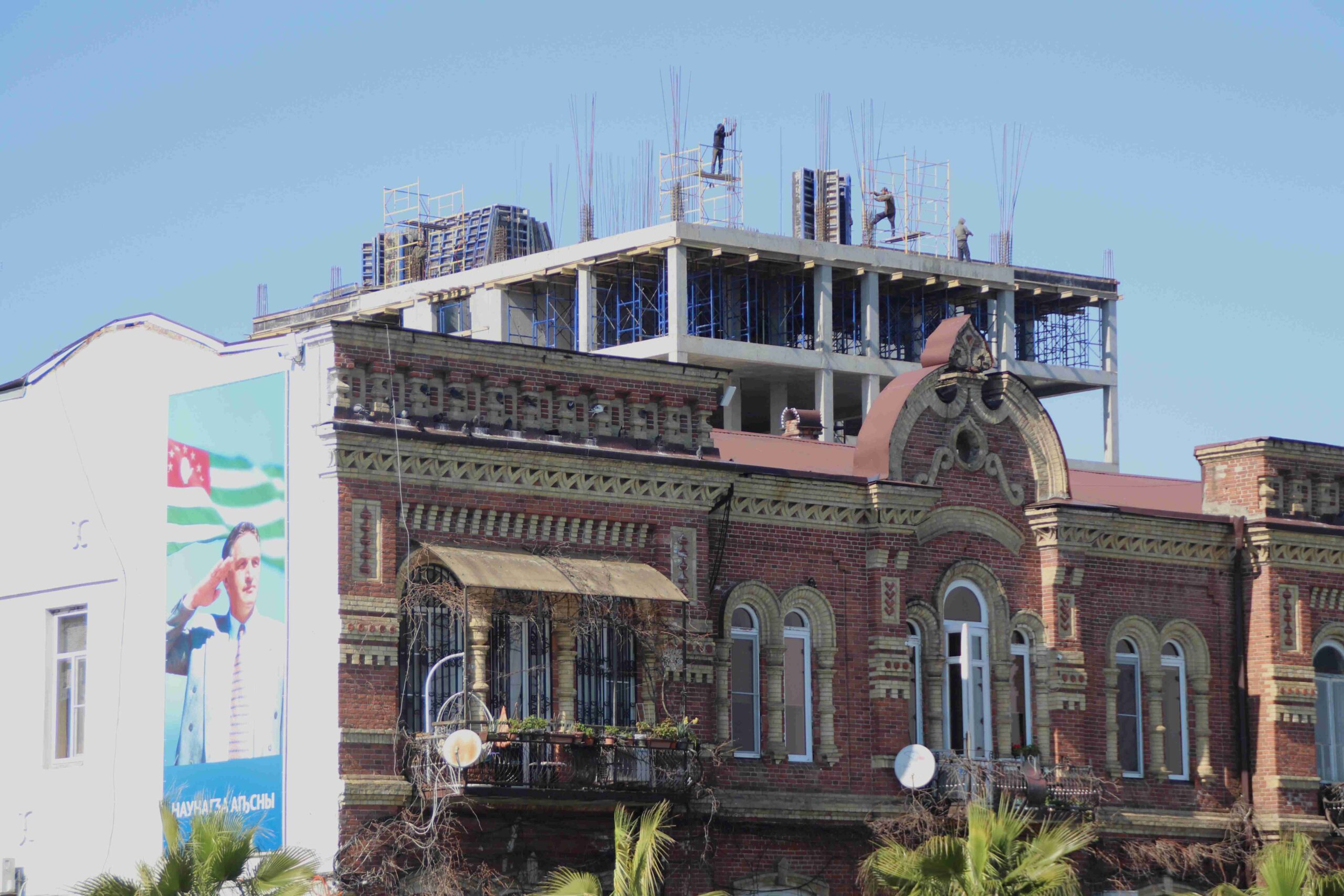
The construction of a multi-storey building in a historic quarter of Abkhazia’s capital has prompted pushback from activists and architects. They claim it breaches building regulations, and poses a threat to the city’s form and function.
Sukhumi’s (Sukhum’s) Kogonia street is a broad and busy street in the city centre, a stone’s throw from the city’s historic waterfront.
Since mid-2022, it has also played host to the construction of a block of flats that has attracted significant negative attention in recent months, with some considering it an eyesore, while others warn it threatens the infrastructure of the entire neighbourhood.
The flats-to-be are prestigiously located, directly behind Sukhumi’s famous Nartaa restaurant and next to the Russian Embassy.
Since the Soviet period, building in this part of the city has been tightly controlled. The longest-running rule was that no building on the embankment could be taller than the Abkhazia Hotel, a five-floor Art Nouveau building and an architectural symbol of the city.
That rule was first violated by the construction of the Russian Embassy in 2010. And while the apartment building’s plans initially suggested that it would remain within the allowed 16-metre height, in the months since its construction began, neighbours noticed that the concrete box appeared increasingly to be looming over the architectural monuments around it.
This building work is also taking place against a tense legal backdrop: since early February, Abkhazia’s parliament has been discussing a controversial draft law on the construction of apartments in Abkhazia.
Activists and opposition groups have raised concerns that the law will make it possible for people who are not Abkhaz citizens to buy property, and so gain residence. Some have connected the two, suggesting that a growing interest in construction in the city centre is connected to the draft law.
While many citizens took note of the construction work, activists from the Hara H-akalak (‘Our City’) movement took action.
The group includes architects, designers, builders, lawyers, journalists, marketers and others, and has since 2019 tasked itself with safeguarding both architectural heritage and responsible development in Sukhumi.
They are now doing all they can to stop the high-rise building’s construction on Kogonia Street.
False promises and dashed hopes
Many have taken issue with the way in which the construction appears to have bypassed the formal and public processes that might have given citizens and experts some say in its construction.
A lawyer from among the activists found a decision of the Sukhumi City Assembly from 12 November 2009, which declared that buildings built ‘between the coast and the railway track from Stroitelnaya Street and Titov Street to the Basla River’ were limited to 16 metres in height; the site of the building is located squarely within the indicated area.
In a public appeal, the group stated that there was no indication that the decision was ever repealed, and invited others to submit any documents that contradicted this.

They added that while the height and style of the building was the ‘sole responsibility’ of the city’s Department of Urban Planning and Architecture, the Mayor’s Office had for years acted without taking relevant regulations into account. They additionally believed the executive branch of government to be responsible for any violations in terms of developments in the city.
Their statement gained public attention, and an official response: on 17 March, Abkhazia’s General Prosecutor’s office announced it would investigate the legality of the building on Kogonia street.
In early March, representatives from Hara H-akalak also met with developer Timur Zarkua, who agreed to rethink the building’s facade. The activists announced in a public statement following the meeting that they hoped the number of floors would change.
But any hopes on that front soon proved misplaced. On 27 March, activist Madina Biguaa stated at a press conference that the building had gained two floors since their meeting, with building work showing no signs of slowing.
‘While the Prosecutor’s Office is ‘checking the legality’ of the development, the developers have added another floor. People are speaking out, but to no avail’, wrote activist Roin Agrba. ‘I want to know: where is the final floor of this monster that’s almost on the embankment?’
A threat to infrastructure
While activists from the group await the outcomes of the Prosecutor General’s investigation, many see the building on Kogonia Street as being emblematic of a broader set of issues relating to a lack of public and expert input into the city’s development, and short-sighted urban management.
‘Our children will inherit what we build today’, architect Beslan Bagatelia tells OC Media.
He explained that Soviet construction had ‘destroyed’ the architectural characteristics of old Sukhumi, and so laid the foundations for the current disagreement.
Introducing high-rise buildings into the city’s historic architectural ensemble ‘led to the consequences that we are facing today’, Bagatelia says.
But builder Astamur Maan takes a more practical issue with the project, believing that the infrastructure in the city centre will not be able to cope with the new building and others like it.
More than one building is being built on Kogonia Street: two more high-rises are being built along the embankment, including one in place of the old Tbilisi Hotel which is currently being demolished.
‘Multi-storey buildings can be good for a developing city and good for the economy, but you need to choose the right place for these buildings. The historical part of the city of Sukhum is quite old, as is its engineering’, Maan told OC Media.
‘It is necessary to select [an appropriate] place for multi-storey buildings, based on some kind of analysis [of] whether engineering infrastructure is able to withstand the demands of a sharply increasing population’, he adds.
Maan says it is necessary to create an urban planning council, to give it broader powers, and for expert members of this council to make decisions about urban construction.
Historian Farid Kobakhi echoes these sentiments in a post on social media, emphasising the importance of properly assessing a building and the impact it will have on the environment around it before its construction.
‘Why is there no understanding that in the process of developing the plan of the city and its facilities there is a crucial stage in which architects play a key role?’ Kobakhi asks. ‘Why is there no system to regulate the appearance of buildings and urban areas?’
Sukhumi’s chief architect declined to comment.
For ease of reading, we choose not to use qualifiers such as ‘de facto’, ‘unrecognised’, or ‘partially recognised’ when discussing institutions or political positions within Abkhazia, Nagorno-Karabakh, and South Ossetia. This does not imply a position on their status.









